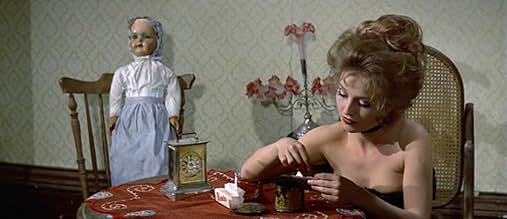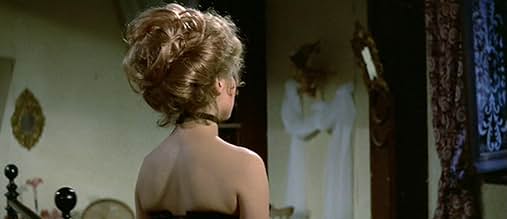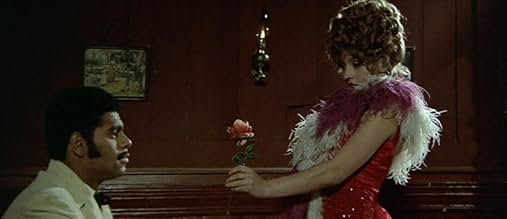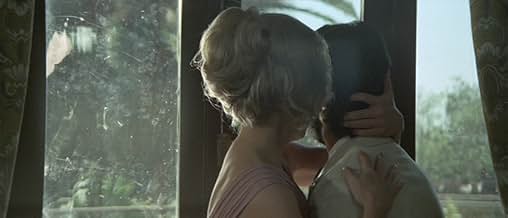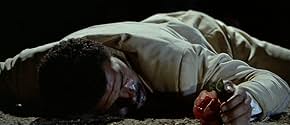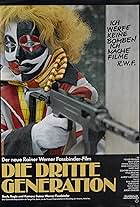Whity
- 1971
- 1h 35m
Whity is the mulatto butler of the dysfunctional Nicholson family in the south-west U.S. in 1878. The father, Ben Nicholson, has an attractive young wife, Katherine, and two sons by a previo... Read allWhity is the mulatto butler of the dysfunctional Nicholson family in the south-west U.S. in 1878. The father, Ben Nicholson, has an attractive young wife, Katherine, and two sons by a previous marriage; the homosexual Frank and the disabled Davy. Whity tries to carry out all thei... Read allWhity is the mulatto butler of the dysfunctional Nicholson family in the south-west U.S. in 1878. The father, Ben Nicholson, has an attractive young wife, Katherine, and two sons by a previous marriage; the homosexual Frank and the disabled Davy. Whity tries to carry out all their orders, however demeaning, until various of the family members ask him to kill some of t... Read all
- Director
- Writer
- Stars
- Awards
- 2 wins & 2 nominations total
- Whity
- (as Günter Kaufmann)
- Davy Nicholson
- (as Harry Bär)
- Fake Mexican physician
- (as Tomas Blanco)
- The Hefty Bartender
- (uncredited)
- Saloon guest
- (uncredited)
- The Pianist
- (uncredited)
- Director
- Writer
- All cast & crew
- Production, box office & more at IMDbPro
Featured reviews
One of the things about the movie that's just totally weird, and yet very weirdly effective, is that the slave owner and family have white make-up put over their already white faces (again, the inverse of Bamboozled, only here not so smug about it being "hey, it's satire!"), and that all of the characters- save maybe for a few minor characters or a supporting one like the saloon singer who falls for Whity- have an affected way of speaking, deliberate like everyone is under some strange spell. What is it all a symbol for? I think, maybe, that racism is so ugly and horrible a thing one can barely ever capture how it affects everyone around them, white or black (the only somewhat down-to-earth figure, Whity's mother played very convincingly by Elaine Baker, is all too brief in the mix for a reason). Fassbinder uses the backdrop of the old west, of a kind of fragmented version of it (he uses sets from other movies, intentionally I'd wager), where this savage but almost meditative story can take place.
Whity shouldn't be something to see right away if you're just getting into Fassbinder - since I'm one of them, I can attest to it being a difficult film - but there's a power about it, some really unique pull to it in some scenes (watch when Whity asks the retarded boy to come over the comb the horse, very tense, erotically so but cruel), that it's hard not to find it at some point if you become an admirer of the prolific German's oeuvre. I'm not even sure I would watch it again, but I know I didn't exactly regret the chance at witnessing risky art.
To be fair, the Western ambiance is delivered in spades throughout. The film was stunningly shot in Widescreen – by Michael Ballhaus (later a valued collaborator of Martin Scorsese) – in Almeria, location site of many a Spaghetti Western. It generally has the right feel for time and place with regards to settings and wardrobe, while the all-important score is highlighted by a decidedly infectious riff. Even so, the repertoire of English-language ballads (the bulk of the film, of course, is in German) allotted to chanteuse/prostitute Hanna Schygulla – not to mention her own affected delivery – is inappropriately modern and comes across as unintentionally laughable! Schygulla was a fixture in Fassbinder’s work; the film also features Ron Randell (best-known, if at all, for playing Christ’s attorney[!] in Nicholas Ray’s KING OF KINGS [1961]) and Ulli Lommel (who later graduated to directing himself, notably TENDERNESS OF THE WOLVES [1973] and THE BOOGEYMAN [1980]).
The overriding pretentiousness at work here is palpable above all in the film’s lethargic, indeed deadly, pace (never have I seen a movie in which the characters moved more s-l-o-w-l-y!). Besides, it isn’t helped by unsympathetic (even annoying) characters – mostly members of a dysfunctional family (and particularly the pasty-faced, frizzy-haired sons of landowner Randell) – indulging in all manners of transgressions (from such commonly-depicted capital sins as greed, lust and murder down to nymphomania, masochism, interracial relationships and incest!). In the midst of all this is an unsavory gay subtext which, inevitably, seems to be on the agenda of virtually all directors so inclined in real-life (but becoming obviously more pronounced in the liberalized modern cinema)!
The plot, for what it’s worth, is reminiscent of Pier Paolo Pasolini’s THEOREM (1968) – coincidentally another gay parable – as the life of everyone involved is influenced in some way by the household’s black manservant (the character bears the ironic titular nickname but is also curiously underwritten and inexpressive), who’s actually the fruit of Randell’s illicit affair with his frumpy colored maid! The fact that each, in turn, pleads with him to slay the other could have turned this into a pointed black comedy – but the film is simply too labored and deliberately self-conscious for the subtlety intrinsic to such refined treatment...
In the end, one should note that 1971 saw a boom of arty Westerns with other such offerings as Alexandro Jodorowsky’s EL TOPO, Peter Fonda’s THE HIRED HAND and Robert Altman’s McCABE AND MRS MILLER. As for WHITY (whose shooting, by the way, inspired Fassbinder’s own BEWARE OF A HOLY WHORE [1971]), I had owned the Fantoma DVD – which includes an Audio Commentary from Ballhaus and Lommel – for quite a while before actually sitting down to view it. I’d purchased the disc through the company’s own website during a sale but, as I said, could only manage to find a slot for it in my hectic/eclectic schedule after having enjoyed a couple of equally stylized (but far more satisfying) Spaghetti Westerns – DEATH SENTENCE (1968) and YANKEE (1966) – earlier this week.
The tale is sewn together with negative characters: Whity's masters' family all who wish to kill his master, a prostitute who lies to the law to protect his master from a murder she has witnessed, a gunslinger (Fassbinder) who hates blacks, Whity's master who lies about his medical condition, etc. Everybody would like to kill or lie.
The end itself is spectacularly negative--something close to Nietzsche's philosophy. Visually powerful end, that beats logic for survival, as we understand it.
Ballhaus' cinematography and Kurt Raab's creditable production design are commendable. Syberberg's actor Harry Baer in two of Syberberg's best films (Hitler; and Ludwig) has a minor role.
For the record the commentary on the DVD is one of the greatest I've heard. However, Ulli Lommel and Michael Ballhaus both agree that this is Fassbinder's 5th movie. That would mean this amazingly photographed, sweeping epic--which boasts by far the best production designs of any of Fassbinder's first movies--followed the crude looking excruciating black comedy "Why Does Herr R. Run Amok?" I find this a bit hard to believe. Judging by the fact that Lommel and Ballhaus make a few factual mistakes (this was not the first Fassbinder movie with Günther Kaufmann, "Gods of the Plague" was), maybe they're a bit off. My guess is probably number 8 or 9. If it is number 5, that's amazing.
Anyhow, this is easily the most polished of Fassbinder's first movies. It's also probably up there with "The American Soldier" in terms of perverse bizarreness. You'll find lots of flaggelating, KKK, incestual undertones, homoerotism, prostitutes, bleached eyebrows and eyelashes, bad hair, greenish-white cakey makeup, and some severe mental retardation all in these frames. The odd thing is, none of it seems to be played for laughs, which only adds to the perversity. Fassbinder thought this movie was so personal to him that he didn't want anyone else to see it, or any movie theaters to show it.
Also of note, the ending of this movie is highly unusual for Fassbinder. No suicide, no crying, no corpses? I guess for the final shot, Fassbinder had his convertable engine running so he could drive off forever into the distance the second it was completed. It just seems directors don't have that type of dedication or personal anguish attached to their movies anymore. All the more reason to keep watching Fassbinder's I guess.
Storyline
Did you know
- TriviaNever released in theaters.
- ConnectionsFeatured in Fassbinder in Hollywood (2002)
- How long is Whity?Powered by Alexa
Details
Box office
- Budget
- DEM 680,000 (estimated)
- Runtime1 hour 35 minutes
- Sound mix
- Aspect ratio
- 2.35 : 1
Contribute to this page


